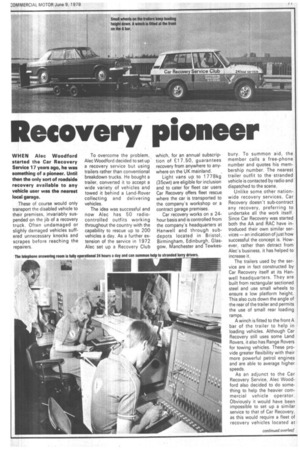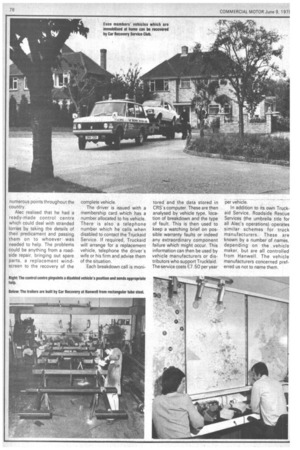Recovery pioneer
Page 79

Page 80

If you've noticed an error in this article please click here to report it so we can fix it.
WHEN Alec Woodford started the Car Recovery Service 17 years ago, he was something of a pioneer. Until then the only sort of roadside recovery available to any vehicle user was the nearest local garage.
These of course would only transport the disabled vehicle to their premises, invariably suspended on the jib of a recovery truck. Often undamaged or slighly damaged vehicles suffered unnecessary knocks and scrapes before reaching the repairers.
To overcome the problem,, Alec Woodford decided to set up a recovery service but using trailers rather than conventional breakdown trucks. He bought a trailer, converted it to accept a wide variety of vehicles and towed it behind a Land-Rover collecting and delivering vehicles.
The idea was successful and now Alec has 50 radiocontrolled outfits working throughout the country with the capability to rescue up to 200 vehicles a day. As a further extension of the service in 1972 Alec set up a Recovery Club which, for an annual subscription of £17.50, guarantees recovery from anywhere to any where on the UK mainland. _ Light vans up to 1778kg (35cwt) are eligible for inclusion and to cater for fleet car users Car Recovery offers fleet rescue where the car is transported to the company's workshop or a contract garage premises.
Car recovery works on a 24hour basis and is controlled from the company's headquarters at Hanwell and through subdepots located in Bristol, Birmingham, Edinburgh, Glasgow, Manchester and Tewkes bury. To summon aid, the member calls a free-phone number and quotes his membership number. The nearest trailer outfit to the stranded vehicle is contacted by radio and dispatched to the scene.
Unlike some other nationwide recovery services, Car Recovery doesn't sub-contract any recovery, preferring to undertake all the work itself.
Since Car Recovery was started both the AA and RAC have introduced their own similar ser vices —an indication of just how successful the concept is. However, rather than detract from Alec's business, it has helped to increase it.
The trailers used by the service are in fact constructed by Car Recovery itself at its Han well headquarters. They are built from rectangular sectioned steel and use small wheels to ensure a low platform height. This also cuts down the angle of the rear of the trailer and permits the use of small rear loading ramps.
A winch is fitted to the front A bar of the trailer to help in loading vehicles. Although Car Recovery still uses some Land Rovers, it also has Range Rovers for towing vehicles. These provide greater flexibility with their more powerful petrol engines and are able to average higher speeds.
As an adjunct to the Car Recovery Service, Alec Wood ford also decided to do some thing to help the heavier commercial vehicle operator.
Obviously it would have been impossible to set up a similar service to that of Car Recovery, as this would require a fleet of recovery vehicles located at numerous points throughout the country Alec realised that he had a ready-made control centre which could deal with stranded lorries by taking the details of their predicament and passing them on to whoever was needed to help. The problems could be anything from a roadside repair, bringing out spare parts, a replacement windscreen to the recovery of the complete vehicle.
The driver is issued with a membership card which has a number allocated to his vehicle. There is also a telephone number which he calls when disabled to contact the Truckaid Service. If required, Truckaid will arrange for a replacement vehicle, telephone the driver's wife or his firm and advise them of the situation.
Each breakdown call is moni tored and the data stored in CRS's computer. These are then analysed by vehicle type, location of breakdown and the type of fault. This is then used to keep a watching brief on possible warranty faults or indeed any extraordinary component failure which might occur. This information can then be used by vehicle manufacturers or distributors who support Trucklaid. The service costs £7.50 per year per vehicle.
In addition to its own Truckaid Service, Roadside Rescue Services (the umbrella title for all Alec's operations) operates similar schemes for truck manufacturers. These are known by a number of names, depending on the vehicle maker, but are all controlled from Hanwell. The vehicle manufacturers concerned preferred us not to name them.




















































































































































